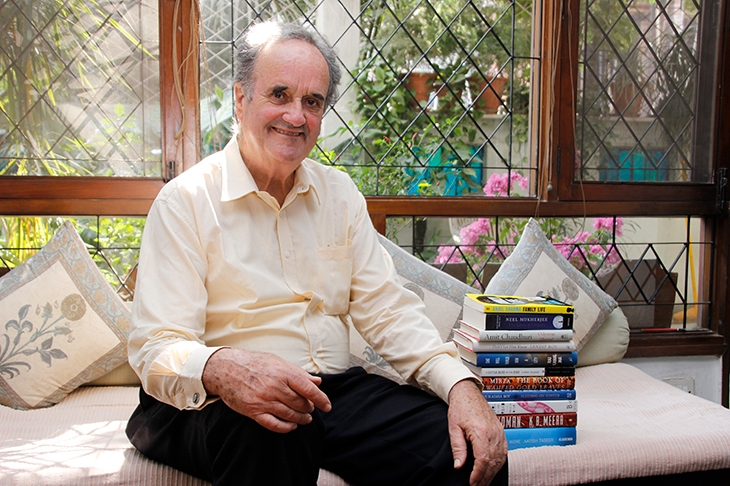It was never given the choicest slot in the schedule, airing first thing on Sunday morning with a repeat at the end of the day. But in its 24 years Something Understood, guided and often presented by the esteemed foreign correspondent Mark Tully, has gathered an impressive audience. Its blend of poetry, prose and music from a huge variety of thinkers, theologians, scientists, poets and composers, carefully (but not artificially) edited around a theme, is for many listeners the best of Radio 4, challenging yet always accessible, highly selective but broad in content. I didn’t always manage to hear it but was glad to know it was there.
Yet on Easter Day Tully presented the last ‘live’ programme, his final script, and in its ending perhaps gave the clue to its success. His sadness at no longer being part of such a project (all that is left are archive recordings of episodes previously broadcast) was, he said, because it had ‘introduced’ him to such a wide variety of ideas, influences and music and ‘to people from many walks of life I would never have met’. The researchers and presenters were always on the lookout for new voices, new thoughts, or old ones given new life by juxtaposition with something unexpected, and after almost a quarter of a century were still excited by what they might find.
On Easter Day Tully took as his theme that line from T.S. Eliot’s Four Quartets,‘In my end is my beginning’, in an attempt to put a positive spin on what for him, and for us, is an unwelcome change, a loss, a new absence. Russian bells announced the Risen Christ followed by a Beethoven late quartet, the Byrds, Berlioz and some Cuban salsa, with words from Simone Weil, Vera Brittain, Marcus Aurelius, Ecclesiastes, as well as Eliot. Tully began with the Resurrection but also touched upon Buddhist reincarnation and his own struggle to accept where he now is ‘in the cycle of life’ (he’s 83).
When asked about why the series was being cut on Feedback, Radio 4’s forum for listeners’ queries and complaints, Gwyneth Williams (the controller of Radio 4), said that it had to be done ‘to make the budgets work’. Yet programmes like Something Understood must be relatively cheap to make compared with drama or news. The big question is whether the money saved will go back into programme-making or be snatched up by an indifferent podcast.
Radio 3 is also being shaken up by budgetary constraints (£800 million of cuts needs to be found across the BBC) with the slimming down of its experimental programme Late Junction to just one night a week (instead of three), much to the annoyance of its dedicated listeners. At the same time there’s a big drive to draw in younger listeners with new millennial presenters, mostly female. This Classical Life on Saturday mornings is presented by saxophonist Jess Gillam who, not to be youthist, is still only 20. Each week she has a guest, also youthful, and together they chat about their musical likes and influences as the music is played behind them.
It took me a while to get used to the idea of them continuing to talk across the music but Gillam is so knowledgeable and enthusiastic that she wins you over and by the end of its half-hour slot I’m left wanting more. Just like Something Understood there’s a mission, shared by presenter, guest and listeners, to discover new sounds, explore beyond what we know already, to refresh and invigorate. Gillam’s guest last week was Belle Chen. They began conventionally enough with Eric Korngold (the Violin Concerto played by Nicola Benedetti, young and female) but soon segued into Herbie Hancock playing Ravel, some experimental clarinet, and then, surprise, surprise, Rachmaninov’s Second Piano Concerto, that vast lush score forever now connected with the romantic film Brief Encounter, not an obvious choice for young, advernturous musicians.
Chen chose it because it was the first CD she ever owned and it takes her back to driving across Australia where she grew up, to the long straight road and vast open spaces. But she also told us that Rachmaninov dedicated the concerto to his clinician, in gratitude for his recovery from the terrible depression he suffered after the failure of his first symphony. ‘You can really relate to that climb up the hill and the release,’ said Chen, sweeping strings rising to a crescendo as she spoke.
‘This one’s a bit harder to sing to,’ said Gillam as the music segued into John Cage’s Sonata V for prepared piano, before asking Chen, a pianist and sound artist: ‘Do you listen in a different way to piano music because that’s the instrument you know?’
‘I’ve never thought about it,’ said Chen, ‘but I must,’ as we moved on to Robert Glasper and then Sibelius and Aphex Twin.
‘Are there any classical pieces you would dance to?’ asked Chen.
‘A lot of Stravinsky,’ was Gillam’s instinctive response, cue The Rite of Spring.
It was a bold move to make room for Gillam in the schedule. She may yet be the voice Radio 3 has been looking for.






Comments